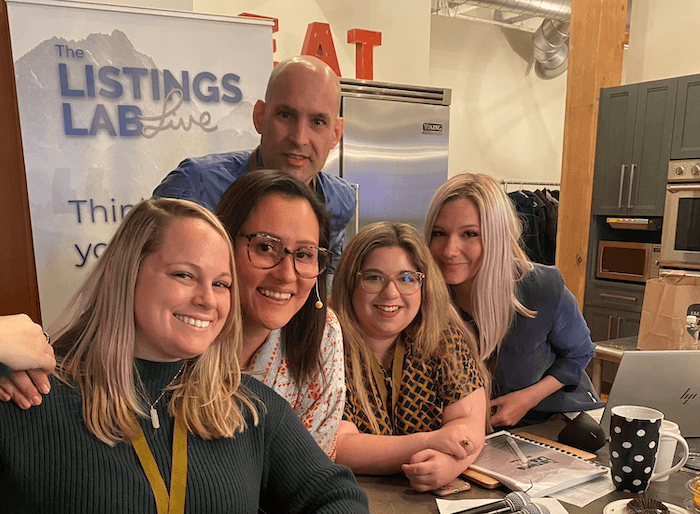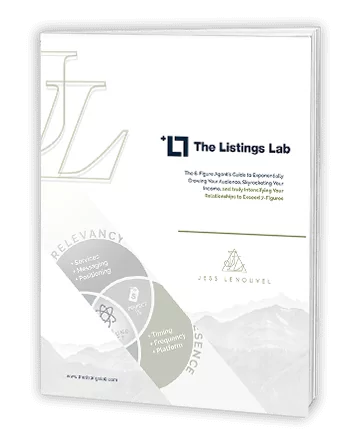Do you feel stuck at a standstill in your real estate business?
Maybe you have big, lofty goals…
- To build a 7-figure business
- To finally take the month-long vacation you’ve been dreaming of
- To build a powerhouse team so you can finally stop working 60-hour weeks
But no matter how grand your vision is, your reality doesn’t exactly match up.
You buy all the planners and business tools, you take the workshops, you buy the books…
And yet no matter what you do, you find yourself in the exact same place.
If you’re having trouble changing what’s in your external reality, it’s time to take a look inward.
If you’re trying all of the tactics and strategies, but you don’t feel like things are shifting, there’s a good chance you’re being held back by fear.
As humans, we’re biologically motivated by fear.
Your brain is designed to scan your environment for threats – and make decisions that will keep you safe.
This means that every time you’re hit with the possibility of leveling up or changing where you are today, your ego steps in, whether in the form of fear or just discomfort.
Your brain does this because it hasn’t caught up yet to the fact that you’re not a caveman being chased by an apex predator.
What your brain knows will keep you safe, it will encourage you to repeat. It’s up to you to choose the scary thing anyway.
Are you ready to conquer your fears as a real estate agent?
These are the five most common fears of real estate agents that might be sabotaging your growth.
Fear Of Failure
If you’ve been struggling to take action in your real estate business – whether that’s joining a coaching program, hiring your first team member, or publishing a video on social media – it could be due to an underlying fear of failure.
This often manifests in the form of waiting for the “perfect time” or the “perfect circumstances” in order to do something.
But waiting for something to be “ready” is just your brain’s way of protecting you from failure, disappointment, and risk.
What you need to know is this – those things are unavoidable. No one is ever fully ready for change. We have to make peace with that fact and get comfortable with the concept of launching and learning.
You don’t get to be great without failure—without launching, learning, and then iterating.
Business is all about problem-solving. If you’re constantly waiting for the perfect answer, you never get to learn what the right solution is. If you go about everything in your business (and your life) from a place of fear of failure, nothing will ever happen to or for you, good or bad.
But while many agents believe that fear of failure is their biggest obstacle, there’s another fear that could be sabotaging your growth plan…
Fear Of Success
Let me tell you a personal story about how this fear showed up for me. 👇
Once, in a single weekend, I secured more deals than I had in the entire previous year. But rather than feel elated, I just felt overwhelmed. I didn’t understand how to process what had just happened. A massive up-leveling had just occurred—and it scared me.
While failure can be devastating, it’s often more clear-cut. Failure provides clear feedback, pinpointing what went wrong. But success? It’s murkier. Often, we’re uncertain about the exact cause, and that ambiguity can be unnerving.
Especially if we’ve been struggling for a while, sudden success can feel alien. Our brain, honed for survival, sometimes interprets success as a potential threat. Our first taste of success forces us to confront our pride and ego in ways we’ve never done before
This skewed perception might explain why some agents who succeed early on eventually lose their way. A large ego can lead to short-sighted decisions. Sometimes, success feels so unfamiliar that we unintentionally self-sabotage so that we can go back to what we knew before.
Finding success is one thing – but committing to the inner work required to grow into your next level is where the real work lies.
Fear Of Being An Imposter
Do you ever feel like successful real estate agents possess some inherent quality that you don’t have?
Here’s a spoiler alert: they don’t.
If you’ve ever felt out of place in real estate or feared someone might expose you as a fraud, you’re likely experiencing imposter syndrome.
Because here’s the deal…
At the end of the day, we’re all coming at challenges and opportunities in our life from a similar human experience.
Incredibly successful people still get nervous. They stress about their taxes. They still make mistakes. They screw things up. They fail.
If you let your impostor syndrome stand in your way of moving forward and making real change—well, for a potential client, the choice is going to be either you or someone else.
So the question is…
Who will you let it be?
Fear Of Judgment
This fear trips up so many real estate agents…especially when it comes to marketing.
This fear often sounds like:
What will they think of me?
Or:
I can’t possibly record a video for Instagram…I need to lose 10 pounds first.
Or even:
There’s no way I can send out that email broadcast…I’m a terrible copywriter.
But here’s the truth: Perfection is the enemy of progress.
Your potential clients aren’t looking for a flawless figure or an award-winning copywriter – they’re looking for authenticity, someone who understands their needs and is real with them.
Every moment you spend dwelling on self-doubt or feeding into that fear of judgment is a moment you’re not serving your clients or building your brand.
The biggest regrets come from the chances we didn’t take, not the ones we did. So, put yourself out there. Your genuine self will resonate far more than any ‘perfect’ version ever could.
Fear Of Making The ‘Wrong’ Choice
Nothing in life is ever permanent.
Yet so many agents act as if once they choose something, they’ll be stuck with it for life.
I often see this fear manifest when it comes to choosing a real estate niche.
Someone might have the desire to niche down and serve divorcees.
But then all of a sudden, they panic, wondering:
What if I don’t want to work with divorcees my whole life? What if I get stuck serving a target market I hate?
Their fear stops them in their tracks, and they go back to serving anyone and everyone.
This fear of commitment to a choice is a common human tendency. It stems from the worry of missing out on other opportunities.
But here’s the real kicker…
Not making a choice at all is also a choice in and of itself.
So you get to decide.
Either you can choose to stay stagnant.
Or you can choose to take decisive action, and then refine as you go.
Remember, growth is often uncomfortable.
But pushing past these fears is what separates those whose income plateaus and those who build successful 7-figure businesses.
So acknowledge your fears – but don’t let them dictate your path. Instead, choose to step outside your comfort zone, take action, and commit to the inner work required to leap to your next level.
If you’re ready to conquer these fears and kick off a journey of growth, I invite you to join the free Facebook group: The Listings Lab Method For Real Estate Agents.
Here, you’ll find a supportive community of like-minded real estate agents dedicated to overcoming these obstacles and leveling up, together.



